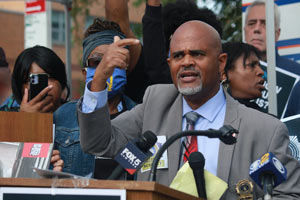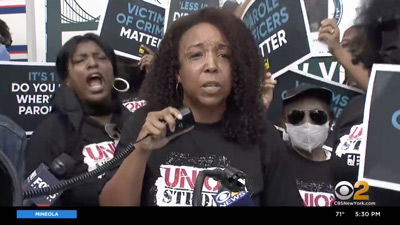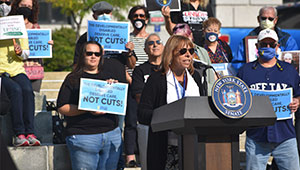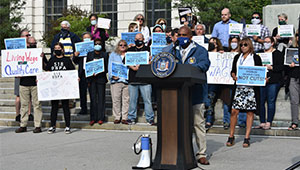More than 130 delegates at the 2021 PEF Convention recorded testimonials about the critical services they provide for their fellow New Yorkers and how difficult the State often makes it for them to do their jobs. This is the first of many videos PEF will be creating to make the case for a State government that truly works in the public interest.
PEF Convention 2021: “Fund Our Future for a Thriving New York”
PEF Convention 2021: “Fund Our Future for a Thriving New York This video was played at the first plenary session of the 43rd Annual PEF Convention in Niagara Falls, N.Y., on Oct. 25, 2021.
PEF Convention 2021 Opening Video: “Fund Our Future for a Thriving New York”

October Communicator
The October edition of the Communicator is now available online @ https://communicator.pef.org/
Telephone Town Hall about Vaccine/Test Mandate
For members who could not attend on Oct. 14, a recording of the PEF Telephone Town Hall about the vaccine or test mandate is now available. (more…)
Vaccine and/or testing mandates
As of Oct. 12, thousands more PEF members are subject to a vaccine or test mandate imposed by New York State. We’ve heard from many of you that your agency does not yet have a clear testing procedure in place, so we will be holding a telephone town hall on Oct. 14 at 6 p.m. to provide the latest information. You may join by dialing (800) 263-5977. We have also created this fact sheet so you know your rights. As a reminder, PEF members who work in patient-facing healthcare jobs are already subject to a vaccine-only mandate. Here is the fact sheet we created for those members, whose mandate went into effect on Sept. 27.
Victims, parole officers matter: Rally denounces Less is More
QUEENS, N.Y. — New York State parole officers rallied outside Rikers Island on Oct. 7, 2021, to denounce the recently signed “Less is More” parole reform law and call out the serious repercussions for community safety, parole supervision and crime victims.
“Bottom line – the “Less” in this law is public safety; the “More” is crime,” said Gina Lopez, a parole officer and member of the Public Employees Federation (PEF), which represents 800 parole officers across New York state. “As parole officers, we want to do our jobs to the best of our ability and this misguided law makes that difficult.”
The “Less Is More” bill unilaterally prohibits parole officers from using their experience, training and knowledge to protect communities from parolees who are willfully and despite repeated warnings continuing down a path toward re-violating the law. It irreparably harms the rehabilitation process for many parolees and eliminates the authority of parole officers to counsel or issue violations to parolees for violations like illegal drug use, alcohol use, skipping curfew and failing to report.

“We believe in reform, but this law requires that we turn our eyes away from those who are still serving their court-imposed sentences, but who continue to demonstrate the same bad behaviors and make the same bad choices that negatively impact their communities and which got them in trouble in the first place,” said PEF President Wayne Spence, a parole officer for almost three decades.
Spence and Lopez, joined by fellow Parole Officer Gabriela Franklyn, shared real-life violations they have seen on the job and pointed to news articles where parolees back out on the streets committed new crimes.

“Since the proposal of this legislation, we as parole officers have continuously requested to have a seat at the table to provide input on effective parole reform within New York, but it has fallen on deaf ears,” Lopez said.
PEF fought Less is More for more than four years, meeting with legislators and lobbying against the bill in Albany. Those demands have not changed since the bill was signed into law by Gov. Kathy Hochul last month. PEF believes meaningful parole reform must impact all aspects of reintegrating parolees into their communities –providing adequate funding for low-cost education, technical training, mental health and wellness, addiction services and housing — while keeping those communities safe and preventing additional crimes. In addition, PEF would like the State to consider amending its sentencing guidelines, which have not changed since 1995. To start, lawmakers should review the legislative risk assessment process that too often saddles parole officers with high caseloads.
“Earlier this year, 90 members of the State Legislature voted ‘no’ on Less is More because we knew it was a mistake,” said State Sen. Diane J. Savino, D, IP-23rd Senate District. “We knew that the narrative being put forward did not reflect the truth of what is happening with parole officers or parolees. Understaffed and under-resourced, our parole officers are not able to adequately support those who are released early to succeed. This bill has been conflated with the disastrous management of Rikers Island and will do nothing to improve conditions for them or those who monitor parolees or those who need their help to regain productive lives.”
“Voting against a bill can be difficult but necessary after careful review of its overall purpose and consequences,” said Senator Joseph P. Addabbo, Jr. “‘Less is More’ is an example of legislation that, while well-intended, does not adequately address concerns for the safety of both residents and parole officers, fairness to victims, or repercussions of the parolee’s overall rehabilitation. Possibly contributing to a more effective solution would be to increase the number of Parole Officers and services to help them assist parolees with housing, mental health and addiction services, and job training,” Addabbo added.
“I stand with the hardworking parole officers who need all available tools at their disposal to do their very difficult jobs,” said State Sen. Todd Kaminsky, D-9th Senate District. “They need our support now more than ever.”
PEF Actions Leading up to the Sept. 27 Vaccine Mandate
On Sept. 17, PEF filed a declaration of impasse with the Public Employment Relations Board (PERB) requesting a mediator be assigned to facilitate impact bargaining with the Governor’s Office of Employee Relations (GOER) over the Sept. 27 vaccine mandate imposed by the New York State Department of Health on patient-facing healthcare workers.
The declaration was emailed to all members subject to the mandate, which includes employees at the three SUNY hospitals, as well as five veterans’ homes across the state, the Helen Hayes Rehabilitation Hospital and Roswell Park Comprehensive Cancer Center. It was also posted Sept. 18 on the PEF website.

Beginning on Monday, Sept. 20, PEF leaders fanned out across the state to visit the impacted facilities and answer member questions. Site visits were made to the following facilities by PEF leaders to educate members about their rights:
- Sept. 20: SUNY Upstate
- Sept. 21: SUNY Downstate
- Sept. 22: Roswell Park, St. Albans Veterans Home, SUNY Stony Brook
- Sept. 24: Long Island State Veterans Home

This fact sheet was also distributed at the events. Throughout the week, PEF posted the photos seen on this page on social media as leaders and staff engaged with members on location.
On Sept. 22, a statement was posted on the PEF website, PEF social media and released to the press as mediations with PERB began. Those mediations concluded on Sept. 24. PEF was able to stave off the State’s attempt to circumvent Article 33 in the PS&T Contract. They will not be allowed to summarily terminate any member who is not vaccinated as of Sept. 27. They must give PEF members their due-process rights. A fact sheet outlining those rights can be found here.
Also on Sept. 22, PEF President Wayne Spence, joined by General Counsel Edward Greene, Director of Contract Administration Deb Greenberg and Director of Field Services Katie Vorwald, conducted a telephone town hall for the 5,861 members subject to the mandate. In addition, President Spence invited Dr. Burton Rochelson, who is the Chief of Obstetrics and Gynecology at North Shore University Hospital, to speak on the call because many members who are pregnant or wish to become pregnant have expressed reservations about getting the vaccine. Dr. Rochelson provided members with the facts, which show pregnant women are greatly at risk from the virus, but the vaccine is not causing problems during pregnancy. He recommended members with concerns talk to their own doctors, but said that he is advising pregnant women under his care to get vaccinated as soon as possible.
While all this activity surrounding the vaccine mandate was happening, PEF also celebrated two victories in the ongoing fight for better nursing compensation. On Sept. 22, PEF signed a Memorandum of Agreement with SUNY that could provide an increase in the overtime rate for many members at the three SUNY hospitals as well as the Long Island State Veterans Home. Gov. Hochul released details in this press release.
More good news for nurses came on Sept. 24, when SUNY announced an increase in the geographic pay differential for nurses working at SUNY Stony Brook. PEF President Wayne Spence advocated for the increase with SUNY Chancellor Jim Malatras. It was SUNY’s decision and not a contractually negotiated pay raise, but any reward for New York’s healthcare heroes is worth celebrating. Details can be found in this SUNY press release.
Crisis at OPWDD: PEF rallies for increased wages, staffing
PEF members, retirees and other disabilities services organizations joined State Sen. John Mannion (D-50th District) on September 14 outside the State Capitol for a rally to spotlight the lack of adequate funding, services and staff at the Office for People With Developmental Disabilities (OPWDD).

A 25-year veteran of OPWDD, PEF Vice President Randi DiAntonio spoke for the 3,500 treatment specialists and dedicated professionals represented by PEF.
“We are outraged by 10 years ofdecimation and cuts to the service system,” she said. “Enough is enough. We need staffing, we need funding.”
OPWDD is in crisis, with the state closing group homes and facilities, paying low wages and refusing to offer hazard pay, resulting in staffing shortages that adversely impacts the state’s most vulnerable citizens.
“This crisis was manmade,” DiAntonio said. “We’re been raising whistles and blaring alarms for years. This is shameful and it needs to stop.”
Some headway may be coming, with the support of Senator Mannion.
“We finally have a champion,” she said, praising the senator for listening to people on the ground who know better than management what is really happening and for holding a hearing to spotlight the workforce problems. “Since he was elected, we have seen a shift.”
Mannion, who chairs the Senate Standing Committee on Disabilities, said the situation is dire.
“The people who do the work know we are in an emergency,” he said. “We need to save our services and support our direct service professionals.”
The senator said people are asking where the staff are and why their loved ones have lost the caregivers they trust and know from years of service. Part of the problem is stagnant wages, deterring new hires from joining state service. It has been a decade since the last cost of living increase for these professionals.

“We need to change the mindset in New York State,” Mannion said. “Let’s fund these programs the way they deserve to be funded.”
PEF President Wayne Spence said members and leaders rallied to call attention to the problem.
“We are here to bring some light and bring some attention to cuts to social services, especially to the developmentally disabled,” Spence said. “We have seen year after year the gutting of social services in New York State. At the same time, we’ve seen exponential increases in shiny new things. Major infrastructure improvements. Major new construction on bridges. I’m not saying that’s not needed, but what good is a bridge, what good is an airport when people come to the state of New York and there are no services?”
VP DiAntonio testifies
Following the rally, DiAntonio testified before the Senate Standing Committee on Disabilities, further highlighting the impacts of the staffing crisis.
“The state of New York has embarked on a long-term effort to reduce funding and staffing at all of its agencies,” DiAntonio stated. “OPWDD has seen some of the most dramatic reductions in staffing over time. This has negatively impacted the availability and continuity of services for New Yorkers with intellectual and developmental disabilities.”
According to data obtained by PEF, OPWDD suffered a 16 percent decrease in staffing from 2011 to 2020, the most recent year available, losing more than 3,700 employees.
“This reduction in staff is directly attributable to the imposition of ‘bare bones’ budgeting at all of the state agencies that has been in place for years so the state can remain under the arbitrary 2 percent annual state spending cap,” DiAntonio said. “This budgeting approach left the state ill-prepared to address the pandemic and has hampered the ability of the state to meet its ethical obligations to maintain the continuity of quality and accessible services for many at-risk New Yorkers.”
The agency is operating with 5,000 fewer employees since the spring 2020 hiring freeze, many of which are direct support professionals, such as nurses. Failure to backfill vacated positions has increased clinical caseloads and, ultimately, diminishes the quality and access to care. The pandemic exacerbated the issue, resulting in $156.7 million in overtime – the most of any state agency during the pandemic.
Stagnant wages and increasing demands hinder the state’s ability to attract staff to OPWDD.
“The pandemic has demonstrated that the state is simply not a competitive employer for professionals like nurses,” DiAntonio said. “The state continues to be a revolving door for these professionals, who are in high demand and maintain high professional mobility. The state needs to do more to attract and retain these critical staff.”
PEF urges the state Civil Service Department and Division of Budget to approve a salary grade increase for Nurse 1 from Grade 14 to Grade 18 and for Nurse 2 from Grade 16 to Grade 20.
“There has not been an increase in the starting grades for nursing titles in 30 years,” DiAntonio said.
Short staffing impacts more than the care of current patients – it prevents access to these vital services for many in need.
“The inability of OPWDD to attract and retain staff, especially nurses, has forced the ‘suspension of services’ or closure of many homes and New York State Developmental and Disability Services Offices (DDSO) across the state,” DiAntonio said. “This dramatic reduction in capacity has affected the availability of services to residents.”
In 2012, programs totaled 2,107, with total capacity at 12,002. In 2019, that dropped to 1,593 programs, with a capacity of 8,863. In 2012, there were 11,770 requests for placement. In 2019, there were 10,936.
“Reviewing the program availability and comparing those program offerings with the total number of requests for placement shows the inadequacy of the current system in meeting the needs of intellectually or developmentally disabled New Yorkers,” DiAntonio said.
The short staffing at OPWDD must be remedied to assure the agency meets its mandate.
“The public interest is best served by high-capacity state agencies that render needed services which are staffed by talented, dedicated and professional public servants,” DiAntonio said. “The state can no longer continue to dedicate state and federal resources solely to maintain the operations of the private provider agencies.”
With 235 hours of overtime in 2020 the average for many OPWDD staff, PEF believes these members should be eligible for hazard pay.
“Many private employers and other state and local governments have already provided this important benefit to their frontline heroes,” DiAntonio said. “However, there continues to be no supplemental or hazard pay for the state’s essential employees who were required to render services throughout the pandemic, putting their lives and those of their families at risk.”
To read the full testimony submitted to the Committee, click here and video here (Randi starts at 1:26:24)
 Time to ‘Fund Our Future’
Time to ‘Fund Our Future’
The rally calls on September 14 to “Save Our Services” echoes PEF’s wider call to “Fund Our Future” and this year’s Convention theme, “Fund Our Future for a Thriving New York.”
The union is forming a coalition to urge the state to provide the funding needed to run state agencies at the capacity needed to offer the best public services to the people of New York.
Members interested in taking an active role in the coalition can visit https://www.pef.org/fundourfuture.
By KATE MOSTACCIO
